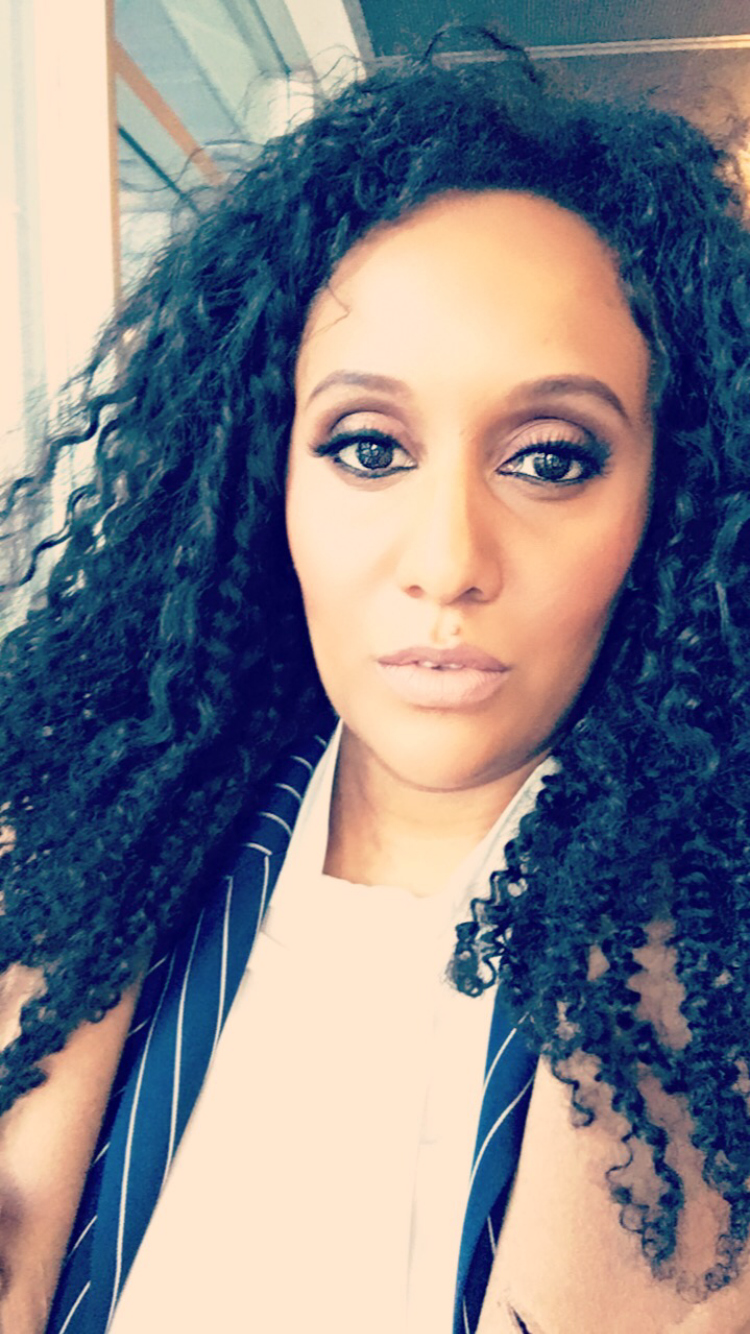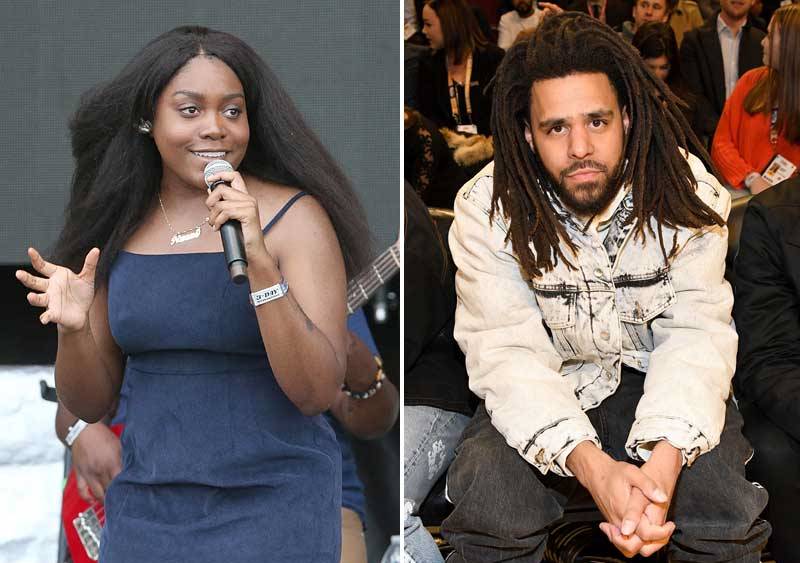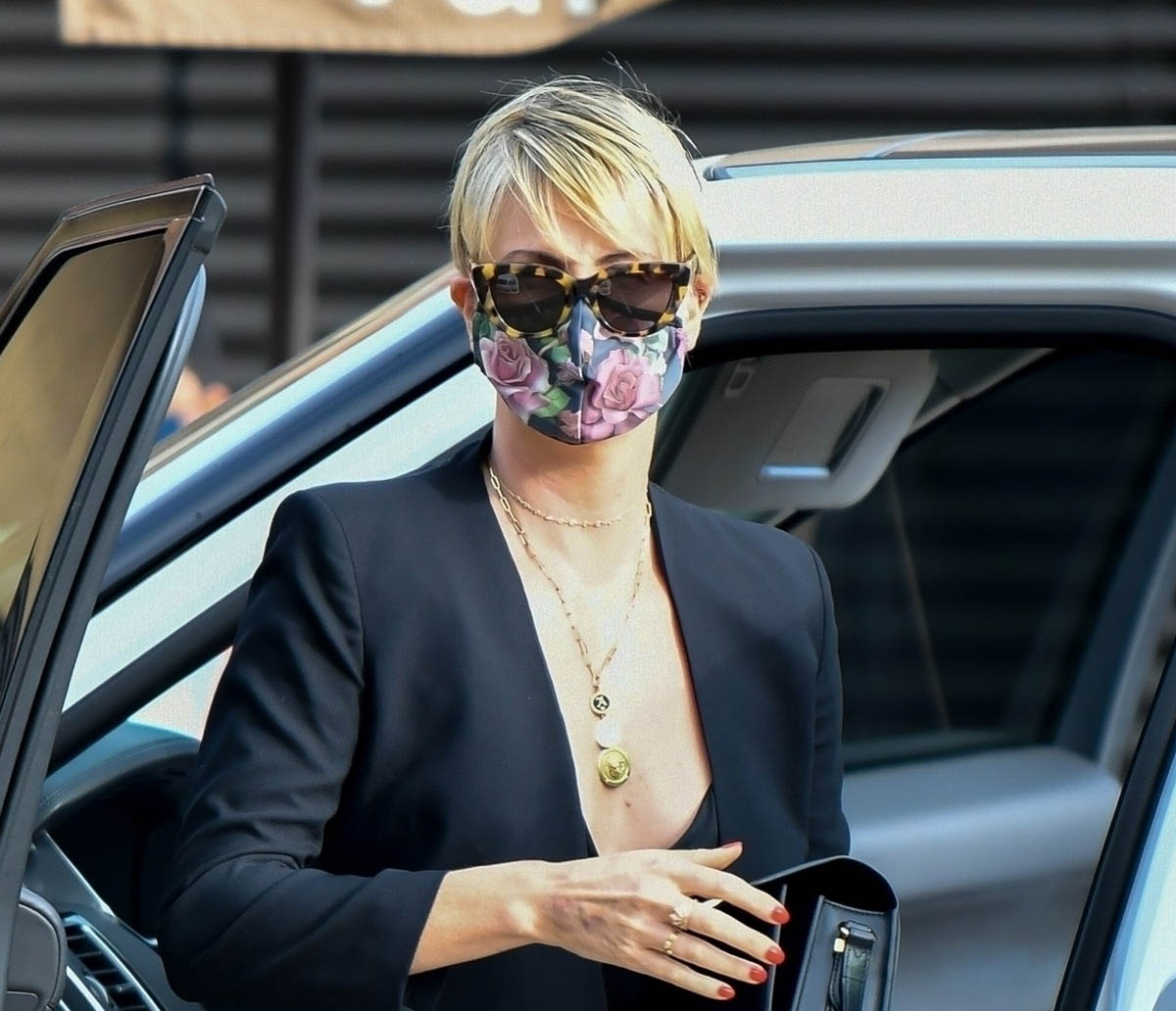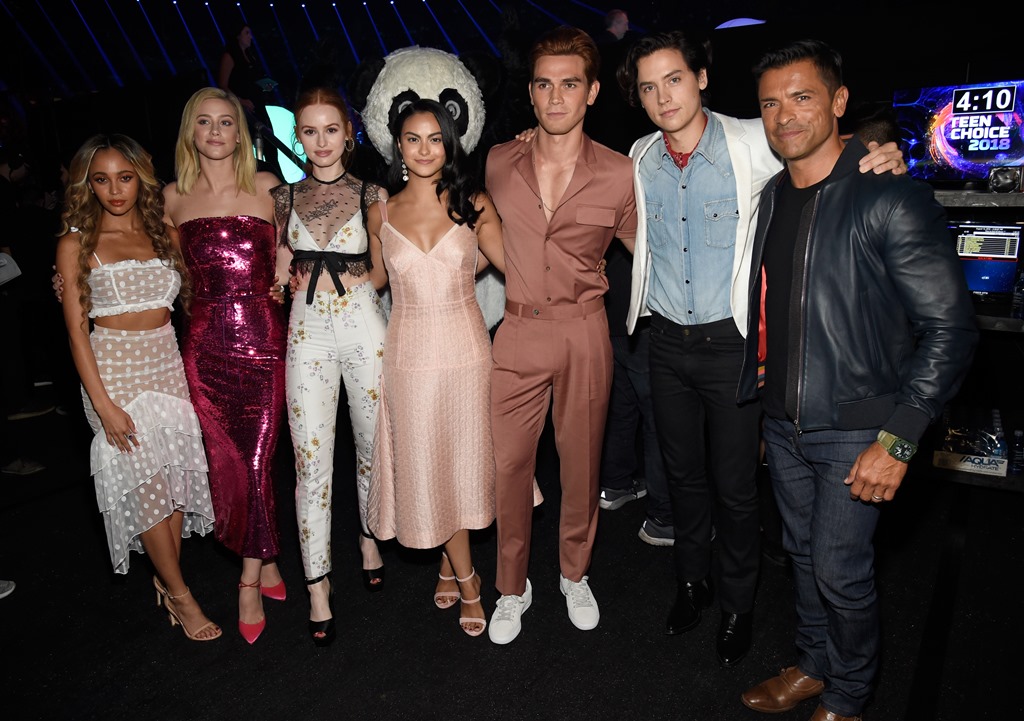Noname, J. Cole, and Toxic Power Dynamics



(This is the latest entry to our Long Reads section. For more Long Reads, please visit the Long Reads page.)
Last week, through music and tweets, we witnessed what some are calling a rap beef, what others are calling healthy discourse, and what I am calling Black men inserting themselves, between rappers J. Cole and Noname. Real names Jermaine Cole and Fatimah Warner, from North Carolina and Chicago respectively, are individual powerhouses on their own, both known to speak truths in their lyrics with varying degrees of social activism and a personal Black pride politic that is found in their art and the way they live their lives. Because of the moment we are in social justice-wise, and messy-wise (the fact that we all don’t really like/know each other like that and have the time to express why), these “diss” tracks and subsequent tweets have been interesting to watch for me, as a fan of both.
It started with J. Cole releasing the track “Snow on tha Bluff”, indirectly taking shots at Noname and her tweets about the movement. Doing what a lot of people are doing with general calls to action, J. Cole seems to have taken it personally that Noname tweeted this on May 29th:
"Poor black folks all over the country are putting their bodies on the line in protest for our collective safety and y’all favorite top selling rappers not even willing to put a tweet up"
She continues:
"n---as whole discographies be about black plight and they no where to be found."
Then on June 16th, J. Cole had this to say on “Snow on tha Bluff”:
“My IQ is average, there's a young lady out there, she way smarter than me
I scrolled through her timeline in these wild times and I started to read
She mad at these crackers, she mad at these capitalists, mad at these murder police
She mad at my n---as, she mad at our ignorance, she wear her heart on her sleeve
She mad at the celebrities, low key I be thinkin she talking bout me…”
And this:
“But sh-t, it's something about the queen tone that's botherin' me
She strike me as somebody blessed enough to grow up in conscious environment
With parents that know 'bout the struggle for liberation and in turn they provide her with
A perspective and awareness of the system and unfairness that afflicts 'em
And the clearest understandin' of what we gotta do to get free
And the frustration that fills her words seems to come from the fact that most people don't see
Just 'cause you woke and I'm not, that sh-t ain't no reason to talk like you better than me
How you gon' lead?... would say it's more effective to treat people like children
Understandin' the time and love and patience that's needed to grow”
This was not a good decision on his part for a myriad of reasons (outlined by countless valid drags on Twitter) but I’ll focus on three: Projecting his insecurities on Noname, tone policing her, then offering advice.
Noname responded on June 18th with “Song 33”, addressing both J.Cole’s misguided shots at her and the bad timing of his messaging, rapping:
“I saw a demon on my shoulder, it's lookin' like patriarchy
Like scrubbin' blood off the ceiling and bleachin' another carpet
How my house get haunted?
She continues:
“But n---as in the back quiet as a church mouse
Basement studio when duty calls to get the verse out
I guess the ego hurt now
It's time to go to work, wow, look at him go
He really 'bout to write about me when the world is in smokes?”
She also refocused and reframed the conversation, speaking on the tragic murders of Oluwatoyin Salau and George Floyd:
“Why Toyin body don’t embody all the life she wanted
When George was beggin’ for his mother saying he couldn’t breathe
You thought to write about me?”
It was glorious, and J. Cole took the L, kinda. On June 17th, while fans of both artists were arguing back and forth on Twitter, he tweeted that he had no regrets about what he said, encouraged his followers to follow Noname, retweeted “Song 33” the next day and said this:
“I haven’t done a lot of reading and I don’t feel well equipped as a leader in these times. But I do a lot of thinking. And I appreciate her and others like her because they challenge my beliefs and I feel that in these times that’s important.”
I’m sure it was jarring for J. Cole to deal with such an instant backlash to what he likely saw as a harmless intervention. It’s clear that J. Cole should have sat and eaten his food, or continued in his incredible rap career, and current participation in protests. It’s clear that he knows he made a mistake. But like countless exchanges between Black men and Black women, publicized or not, behind closed doors or for the world to see, the power imbalance, the gaslighting, none of it sits well with us anymore.
Chance The Rapper was one of the first to call out J. Cole for misogyny, tweeting:
“Yet another L for men masking patriarchy and gaslighting as constructive criticism.”
And when responding to a fan on Twitter, Chance tweeted:
“They both my peoples but only one of them put out a whole song talking about how the other needs to reconsider their tone and attitude in order to save the world. It’s not constructive and undermines all the work Noname has done. It’s not BWs job to spoon feed us. We grown.”
He is absolutely right. The work Noname has done is on-the-ground activist work that you can read about here. Further, I am so delighted that Chance choose to defend Noname in this way: specifically naming the ways in which we are silenced, even while doing work. This is particularly important considering how much tireless advocacy Black women do in the name of Black men. Chance seems to be extending the politic of “protect Black women” from the often empty lip service we see on social media to practice. Doing the opposite, Bun B decided to insert himself and strung together some vague words about how we all have to come together, and if there is a conflict, keep it a secret, writing in part on Instagram:
“While I understand the very human need to defend yourself and your position, I don't want us to diver our attentions from what's at the core of our cultural conversation right now. If we have issues with someone or need clarity on something, let's try to have that conversation behind closed doors.”
First of all, asking Black women to be silent is not only dangerous, it’s terrible timing. Interesting how he sounds like white people determined to erase history and avoid racism with meaningless platitudes about solidarity. More on that later.
One of my favourite rappers ever, Detroit’s Royce Da 5’9, said this in a video:
“I don’t think we should hyper focus on that sh-t at all...I think all of us should rally behind and put on a pedestal, Noname, and crown her as the queen that she is. Make her feel respected, protected, and make her feel like she has a place in this culture the same as J. Cole. Nobody’s mad at J. Cole. You hold him to a high standard and aren’t used to him having bad timing or misfiring...doing everything perfect because you placed him on a pedestal…that you forgot even he is not above making a mistake.”
I love it! But then he said this:
“…his positives are always going to outweigh his negatives. He’s never contributed to the misappropriation or the disrespect of Black women within the culture, he’s never said homophobic things in his music...”
Misogyny is misogyny in rap, whether it’s the blatancy of it that we are used to, or the conscious rappers reminding us that they too, dislike women. Like Common said on Kid Cudi’s 2009 hit “Make Her Say”:
“But they say you be on that conscious tip
Get your head right and get up on this conscious dick”
I mean, rappers need women, especially Black women, constantly – we are the prizes in beauty aesthetic and status they attain through monetary reward and fame, we are who they are talking about when they complain about us or degrade us, and apparently, according to this particular story, it’s our fault they aren’t woke either. Anyway, to counter Royce’s point, some of my favourite J. Cole songs include “Trouble” and “Lights Please.” In those songs, he raps:
“The bitch want too much, hit my phone too much
If I gotta be frank about it
Ain't worth the stress
First the text, then the draws, see first is sex
Then it's calls cause the bird's obsessed
Want flowers, cards, and the purses next
Nah, bitch can't get a dollar
Cole on Twitter, bitch can't get a follow
Can get a nut, heard "Can't Get Enough"
Now she f-ck a n---a thinking that she may have hit the lotto
No way, Jose/Could write a book called, "The Things Hoes Say"
Show a lot of love to my sisters though/But these bitches so predictable
I'm in trouble”
“But, you see, the sad thing f-ckin' with her is/Is the chick ain't even have brains, dummy like a bitch
So I tried to show her about the world
And about just who we really are
And where we've come and how we still have to go really far
But all she ever want me to do is unhook her bra
Then all I really want is for her to go down low
Before you know it, she wet enough to get drowned slow
And all that deep sh-t I was previously down fo'
Replaced by freak sh-t I am currently down fo'”
And I get it. J. Cole is an amazing artist and we are all full of contradictions. It’s great that he’s had the opportunity to grapple with the reality that certain women are deemed socially more valuable at the expense of others, a stereotype often loaded with notions of respectability politics around education, sexual prowess, and more. But his misconceptions cannot be without consequence because he makes good music, especially now. Black women have things to say, for many reasons, including our constant centering and protecting of Black men. As writer Jamilah Lemieux said when she tweeted about this situation:
“Black women have never based our support of our men on how they treat us, we’ve offered it up even to those among them who have violated our minds, bodies and souls. And that is changing. There should have always been a standard and now, one is finally emerging.”
What bothers me the most about this ever evolving and reckoning conversation between Black men (especially cisgender, straight Black men) and Black women is the derailment of it. What are the ways Black men show up for us that shield them of critique? How does that even make sense? Judging from J. Cole’s response, infantilizing himself and others who aren’t woke as needing to be educated as “children”, and his fans who agree, why exactly should we tolerate being the mules for our community when trans Black women are being killed for simply existing, a fate straight Black men should relate to immensely? Oftentimes, a fulsome Black feminist politic is so inclusive it captures the rights of everyone…but can Black men say the same? Then when it comes to critique, they want to be measured with a tape made of their own design, at their own pace, with grace that is often abandoned when we flip the focus to us.
On June 8th, A&E (in partnership with NAACP and OXY) released the special, The Time is Now: Race and Resolution. During a segment specifically focused on Black women and girls, panelists discussed the repetitive pain in the erasure of Black women murdered by law enforcement within the movement, including but not limited to Breonna Taylor, Korryn Gaines, and Sandra Bland. Here in Canada, we are still mourning and demanding answers from the police for the death of Regis- Korchinski Paquet.
National Director for the NAACP youth and College Division, Tiffany Loftin, speaks on misogynoir and the tired (and thankfully now publicly acknowledged) ways white feminism does not protect us, saying:
“Because femininity is only a weapon if you’re a white woman. We have seen and watched white women weaponize their whiteness and their gender to get what they want, and to know how they show up in violence, and Black women are not protected in this country…the lack of attention is clear…showing up for all Black people…Black lives matter includes Black women and trans folks.”
Writer Jemele Hill precisely frames how this conversation is blocked within our own Black homes and communities, saying:
“The conversation in our community that is often difficult and never had is about gender...because unfortunately a lot of Black men take that personally as if we are criticizing them, doing the same thing white people do to them when all we want to do is have a real, honest conversation about gender in our community that’s still never been had. And that’s part of the reason this invisibility occurs inside our own house.”
We have to be honest in the ways we speak in this intracommunity fashion with Black men; silence is not the answer. Not when straight Black men yield their male privilege over us, duplicating the toxic power dynamics that white supremacy yields on them.

